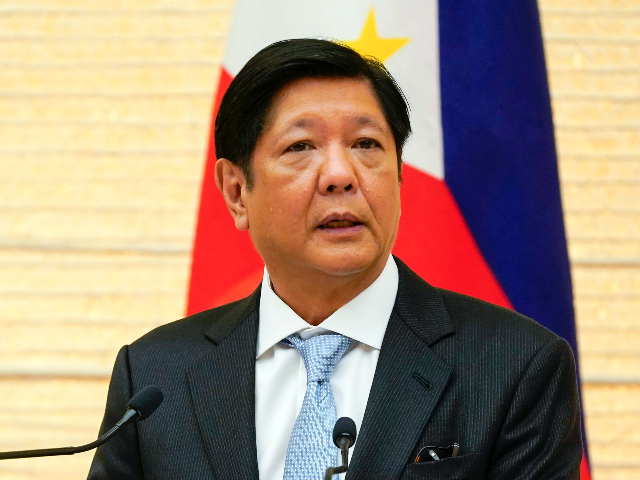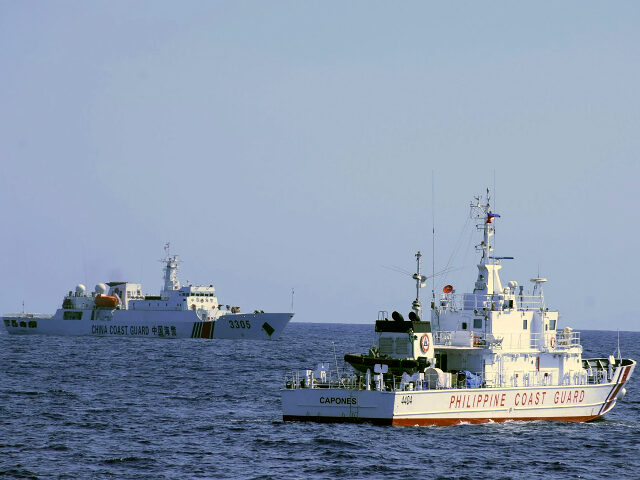The Philippine Coast Guard (PCG) on Monday accused a Chinese ship of attacking a Philippine ship called BRP Malapascua with a powerful laser during a resupply mission, temporarily blinding some of the crew.
The Chinese vessel also made “dangerous maneuvers” by closing to within 150 yards of the Malapascua, forcing the Philippine ship to alter its course.
The incident occurred on February 6, while the Malapascua was on a rotation and resupply mission to Ayungin Shoal in the Spratly Islands.
Ayungin Shoal, also known as Second Thomas Shoal, lies within the Exclusive Economic Zone of the Philippines, but China covets the region and has illegally claimed dominion over nearly the entire South China Sea, including the parts Manila refers to as the West Philippine Sea. The Philippines won a landmark international arbitration case against China’s expansive claims in 2016, but China simply ignored the ruling.
The Philippine Navy established a permanent presence on Ayungin Shoal in 1996. Philippine naval activity increased after Chinese ships began bullying Filipino fishermen away from the shoal.
The Philippine “base” on the shoal is a decommissioned U.S. Navy ship christened BRP Sierra Madre sold to Manila in the 1970s and deliberately run aground on the shoal in 1999. A small number of Filipino troops have been kept stationed on the ship ever since, supported by regular supply drops and personnel rotations, to the great annoyance of the land-hungry Chinese, who frequently attempt to interfere with supply missions.

This photo provided by the Philippine Coast Guard shows a Chinese coast guard ship in the disputed South China Sea, Monday, Feb. 6, 2023. The Philippines on Monday, Feb. 13, accused a Chinese coast guard ship of hitting a Philippine coast guard vessel with a military-grade laser and temporarily blinding some of its crew in the disputed South China Sea, calling it a “blatant” violation of Manila’s sovereign rights. (Philippine Coast Guard via AP)
The regime in Beijing occasionally threatens to destroy or tow the Sierra Madre, but the Philippine government classifies it as an active military vessel, so molesting it would be an act of war.
In November, a Philippine resupply mission to Ayungin Shoal was driven off by Chinese vessels firing water cannons. The Philippine government reprimanded China for the attack, reminding Beijing that it has no territorial enforcement rights around the shoal.
On several occasions in January, Filipino fishing boats working near Ayungin Shoal were forced away by belligerent Chinese Coast Guard ships. One of these incidents occurred on January 9, less than a week after Philippine President Ferdinand Marcos, Jr. returned from a state visit to China. The PCG deployed more vessels to the area in response.
The February 6 incident looks like another significant escalation, as a Chinese Coast Guard vessel moved to intercept the BRP Malapascua about ten kilometers out from Ayungin Shoal and then flashed it twice with a military-grade laser. The Chinese ship then made “dangerous maneuvers” until the Malapascua changed course to Lawak Island and linked up with another resupply vessel, the BRP Teresa Magbanua.
The same Chinese ship reportedly attempted to block the Teresa Magbanua as well. According to the PCG, the Chinese ship removed the cover from its 70mm gun when the Teresa Magbanua did not change course. Another Chinese Coast Guard ship and two Chinese Maritime Militia ships – essentially fishing boats that carry heavily-armed paramilitary troops – later joined the blockade around the shoal.
“The deliberate blocking of the Philippine government ships to deliver food and supplies to our military personnel on board the BRP Sierra Madre is a blatant disregard for, and a clear violation of, Philippine sovereign rights in this part of the West Philippine Sea,” the PCG said.
“The PCG will continue to exercise due diligence in protecting the country’s territorial integrity against foreign aggression,” vowed Commandant Artemio Abu.
Chinese Foreign Ministry spokesman Wang Wenbin responded on Monday by accusing the Philippine ship of “trespassing” and insisting the Chinese Coast Guard acted “professionally and with restraint.”
Wang falsely stated that the area belongs to China – the very claim that was struck down by international courts in 2016 – and then incorrectly stated China’s actions to drive away Philippine ships were consistent with the U.N. Convention on the Law of the Sea.
Wang pointedly refused to discuss the professional and restrained Chinese troops blinding the Philippine crew with a military laser. Chinese forces have used lasers against American and Australian crews on numerous occasions over the past four years, including attacks that could seriously endanger the pilots of aircraft struck by high-intensity laser light.
“We hope the Philippines will earnestly respect China’s territorial sovereignty and maritime rights and interests in the South China Sea and avoid any actions that may lead to the expansion of the dispute and complication of the situation,” Wang said.
Philippine President Marcos, Jr. said on Sunday that he was open to the possibility of signing a Visiting Forces Agreement (VFA) with Japan, similar to the one his government renewed and expanded with the United States at the beginning of February. Under the Philippine constitution, foreign forces cannot establish permanent bases on Philippine soil, but they can be granted extensive access to Philippine facilities as “visitors.”

Philippine President Ferdinand Marcos Jr. speaks with Japanese Prime Minister Fumio Kishida during their joint press remarks after their talks at prime minister’s official residence in Tokyo, Thursday, Feb. 9, 2023. (Kimimasa Mayama/Pool Photo via AP)
Marcos Jr., who paid a visit to Tokyo last week and met with Japanese Prime Minister Kishida Fumio, said a VFA with Japan is “certainly under study.”
“I think it really is just a progression of what has already been happening. So we are just intensifying our joint exercises. And Japan has provided a lot of materials for us in the Philippines to be able to safeguard our territorial waters – vessels, equipment and communications,” he said.
“Perhaps because, shall we say, the temperature in the region has slowly ratcheted up, we have to also, as a response, be more judicious in making sure that we are defending properly our sovereign territory,” he suggested.
Marcos, Jr. said it was important for the Philippines to work with Japan and other regional allies to ensure “continuing safe passage” across the South China Sea, without taking “grand steps” that might provoke Beijing.
“We have to be very careful not to be provocative. We must continue to remember that Philippine foreign policy is a relatively simple one. It is a commitment to peace, and we are guided by our national interest,” he said.

COMMENTS
Please let us know if you're having issues with commenting.